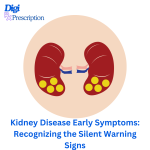
Early detection is critical to slowing progression and preventing complications like kidney failure. This blog highlights the subtle early signs of kidney disease, empowering readers to seek timely care and protect their renal health.
Why Early Detection Matters
When they malfunction, toxins build up, leading to systemic issues. Over 37 million U.S. adults have chronic kidney disease (CKD), and 90% don’t know they have it (National Kidney Foundation, 2023). Recognizing early symptoms can save lives.
10 Early Symptoms of Kidney Disease
Fatigue and Weakness
Cause: Anemia due to reduced erythropoietin production.
Sign: Persistent tiredness, even after adequate rest.
Swelling (Edema)
Cause: Fluid retention from impaired kidney filtration.
Common in: Legs, ankles, feet, and face.
Changes in Urination
Foamy urine (proteinuria), frequent urination (especially at night), or reduced output.
Stat: Protein in urine is the earliest sign of kidney damage (NIH, 2023).
Persistent Itching
Cause: Mineral and electrolyte imbalances (e.g., high phosphorus).
Nausea or Loss of Appetite
Cause: Toxin buildup (uremia) affecting digestion.
Metallic Taste or Ammonia Breath
Cause: Waste accumulation in the bloodstream.
Shortness of Breath
Cause: Fluid in the lungs or anemia reducing oxygen delivery.
High Blood Pressure
Link: Hypertension damages kidneys, and kidney disease worsens hypertension.
Muscle Cramps
Cause: Electrolyte imbalances (low calcium, high potassium).
Difficulty Concentrating
Cause: Anemia or toxin buildup affecting brain function.
When to See a Doctor
Consult a healthcare provider if you experience:
Persistent fatigue or swelling.
Blood in urine (hematuria).
Sudden weight loss or appetite changes.
Diagnostic Tests:
Blood tests (eGFR, creatinine).
Urine tests (albumin-to-creatinine ratio).
Imaging (ultrasound, CT scan).
Prevention Tips
Manage Underlying Conditions: Control diabetes, hypertension, and obesity.
Stay Hydrated: Drink water to help kidneys flush toxins (unless fluid-restricted).
Avoid NSAIDs: Overuse of painkillers like ibuprofen harms kidneys.
Eat a Kidney-Friendly Diet: Limit salt, processed meats, and phosphorus-rich foods.
Hope Through Early Action
Early-stage kidney disease (Stages 1–3) can often be managed with lifestyle changes and medications. Innovations like AI-driven diagnostics and biomarker research are improving early detection (The Lancet, 2023).
References:
National Kidney Foundation. (2023). CKD Statistics in the U.S.
NIH. (2023). Proteinuria as a Marker of Kidney Damage.
Mayo Clinic. (2023). Symptoms and Causes of Chronic Kidney Disease.
The Lancet. (2023). Advances in Early Kidney Disease Detection.
American Heart Association. (2023). Hypertension and Kidney Disease.
Disclaimer: This blog is for educational purposes only. Always consult a nephrologist or healthcare provider for personalized advice. ????????
By recognizing these early signs and prioritizing kidney health, individuals can take proactive steps to safeguard their well-being.
